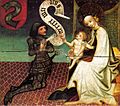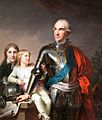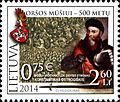Szlachcic facts for kids
A Szlachcic (pronounced shlah-kheets) was a member of the Polish nobility. This group of people had special rights and a high social standing in the Kingdom of Poland and later in the Polish–Lithuanian Commonwealth. Being a Szlachcic meant you were part of a powerful and important class, similar to knights or lords in other countries. They played a huge role in shaping the history and culture of Poland for centuries.
Contents
Who Were the Szlachta?
The Szlachta were the noble class in Poland and Lithuania. They were not just rich landowners; they were also warriors and politicians. Their power grew over time, making them very influential in how the country was run. They were known for their strong sense of freedom and their unique traditions.
Becoming a Noble
Most people were born into the Szlachta. It was usually passed down from father to child. Sometimes, a person could be granted nobility by the king for special service, like bravery in battle. This was rare, but it did happen.
Life of a Szlachcic
The life of a Szlachcic varied a lot. Some were incredibly wealthy, owning huge estates and many villages. Others were much poorer, sometimes owning just a small piece of land or even no land at all. Despite their different wealth levels, they all shared the same noble rights and pride.
Daily Life and Homes
Wealthy Szlachta lived in grand manor houses or castles. They had many servants and enjoyed a comfortable life. They spent their time managing their lands, hunting, and participating in politics. Poorer Szlachta often lived in simpler homes, sometimes working their own land alongside peasants.
Fashion and Style
The Szlachta had a very distinctive style, especially during the 17th and 18th centuries. They often wore a long coat called a kontusz over another garment called a żupan. They also wore a special peaked cap called a rogatywka. This fashion was part of their unique identity, known as Sarmatism. It showed their pride in their Polish heritage and their belief that they were descendants of ancient warriors.
Golden Liberty
One of the most important things about the Szlachta was their "Golden Liberty." This was a set of special rights and privileges they had. It meant they had a lot of say in how the country was governed.
Electing the King
Unlike many other European countries where kings inherited their thrones, in Poland, the Szlachta elected their king. This was a huge deal! All male Szlachta had the right to vote for the next king. This made the king less powerful and the nobility more powerful. This system was called royal election.
Laws and Parliament
The Szlachta also had a powerful parliament called the Sejm. No new laws could be passed without the Sejm's approval. This meant the king couldn't just do whatever he wanted. The Szlachta had a strong voice in all major decisions, from taxes to war. This system gave them a lot of control over their own lives and the country's future.
Famous Szlachta
Many famous people in Polish history were Szlachta. They were leaders, generals, artists, and thinkers.
- Władysław II Jagiełło: A Grand Duke of Lithuania who became King of Poland. He founded the Jagiellonian dynasty, a very important royal family.
- Jan Zamoyski: A great military commander and statesman. He was a key figure in Polish politics and helped strengthen the Commonwealth.
- Michał Kazimierz Ogiński: A wealthy and influential nobleman who was also a composer and patron of the arts during the Enlightenment.
- Karol Stanisław "Panie Kochanku" Radziwiłł: One of the richest and most powerful nobles of his time, known for his lavish lifestyle and political influence.
Decline of the Szlachta
Over time, the power of the Szlachta began to weaken. The "Golden Liberty," which once made Poland unique, also led to problems. Sometimes, the Sejm could be paralyzed because any single member could block a decision, making it hard to pass important reforms. This made the country weaker, and eventually, Poland was divided up by its neighbors in the late 18th century. After this, the Szlachta lost many of their special rights and their political power.
Even though their political power ended, the legacy of the Szlachta lives on. Their history is a big part of Polish culture and identity.
Images for kids
-
Szlachta in costumes of the Voivodeships of the Crown of the Kingdom of Poland, Grand Duchy of Lithuania and the Polish–Lithuanian Commonwealth in the 17th and 18th century.
-
Depiction of defeated Sarmatians on a Roman relief, first half of the 2nd century AD
-
Epitaph of Polish nobleman John of Ujazd sealed with the Srzeniawa coat of arms by unknown artist. It is located at the church of Czchów, Kraków Voivodeship, Lesser Poland province, Crown of the Kingdom of Poland; 1450.
-
Election of Stanisław August Poniatowski in 1764
-
Franciszek Salezy Potocki, wearing the Order of the White Eagle.
-
A Polish Nobleman. Rembrandt, 1637
-
The Commonwealth's Power at Its Zenith, Golden Liberty, the Election of 1573. Painting by Jan Matejko
-
Henry of Valois, first elected monarch of Poland-Lithuania
-
Dożynki by Alfred Wierusz-Kowalski, 1910
-
Bolesław I the Tall with a heraldic shield, by Jan Matejko
-
Hetman Jan Zamoyski, as a representative of Sarmatism.
See also
 In Spanish: Nobleza de Polonia y Lituania para niños
In Spanish: Nobleza de Polonia y Lituania para niños

























